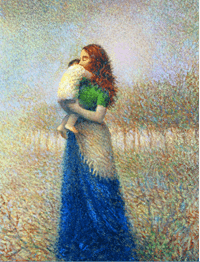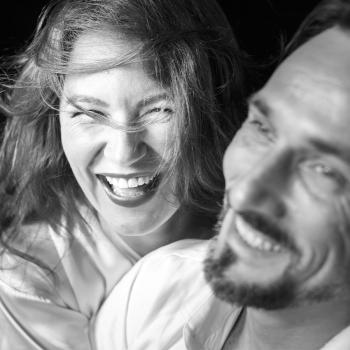 By Angela Franks
By Angela Franks
It's not hard to imagine: an issue that deeply impacts personal lifestyle choices inflames political discourse. On one side are those who insist that all choices should be respected: what is right for one person is not necessarily right for everyone. Let's call this the "pro-choice" side. On the other side are those who argue that there can be no choice in the matter, because only one choice is right. We'll call this the "anti-choice" side. Democrats and Republicans line up against one another in the midst of a heated culture war.
This may sound like contemporary abortion politics, but in fact our country has seen this before: in the 1850s. We were arguing about slavery.
In famous debates with Abraham Lincoln, Stephen A. Douglas took a "pro-choice" position on slavery. Douglas argued that each state should decide the matter for itself. In his day, Douglas was the moderate. He refused to be either pro-slavery or anti-slavery. His position was reasonable, based on dialogue and consensus ... right? Not so, argued Lincoln. The basic human rights of a person, such as the right to life and liberty, cannot be up for discussion. No one has the right to choose to violate such basic rights of another.
Why am I talking about slavery in an article on abortion? Because it provides the best analogy for understanding the Catholic Church's teaching on abortion. Many people wondered why bishops would oppose a Catholic university's giving an honorary degree to a pro-abortion choice politician, as happened recently at Notre Dame. Substitute "slavery" for "abortion," in the conversation and the reasons become clearer.
The Church recognizes that some choices are always wrong. It is always wrong to deprive an innocent human being of his or her life. The Declaration of Independence highlights this universal truth when it speaks of the "unalienable" rights to life and liberty. We take these rights for granted. When I walk down the street, I assume that no one has the right to attack and kill me. In outlawing murder, our society is not taking a "religious" position. Rather, it recognizes the right to life as the basic human right, which all people are bound to observe, whether religious or not.
Is the unborn child a unique member of the human species, therefore possessing the right to life? When you were in the womb, no scientist examining your DNA could have confused you with a fish or a cockatoo. Indeed, your chromosomes indicated your sex: you were a male or a female from the very beginning. By 22 days after conception, before your mother even realized she was pregnant, your heart was beating. By the time most abortions are performed, around seven weeks, you had brain waves (appearing around 40 days) and arms and legs (45 days). You were "you" from the first moment of conception -- just very small and defenseless, needing the sustenance of your mother's womb so that you could develop and grow. (Actually, something similar could be said of you as a newborn!)
When the Catholic Church opposes abortion, it is not out of misogyny. It is because the powerless must be protected in law. And Catholic organizations provide real help for women and girls in crisis-pregnancy situations. Abortion is no solution for women. Let's give an extreme example: think of a poor, drug-addicted teenager who is pregnant by her adult "boyfriend." Give her an abortion. What is she now? She is now a poor, drug-addicted teenager with an abusive "boyfriend" -- and a dead child. Abortion eliminates no problems, just a person.
Women need real solutions to their problems. Abortion is never a real solution, because the unborn child is never the real problem. When we "offer" abortion to women and girls, we conveniently forget about the real problems, because the problems are hard to fix. Abortion seems easy. Men don't have to grow up and become fathers. Families don't have to sacrifice to support pregnant daughters. No one's lifestyle has to change. Easy ... except for the woman who is left with the nightmares and the tears. If the scared teenager chooses adoption, it will be hard, but she will have memories of loving generosity, not of blood and violence.
Abraham Lincoln understood that the evil of slavery had to be set on a legal path to extinction. He foreswore the temptation to take the easy route of being "pro-choice" on slavery. Now we are called to another great human-rights cause: to defend the right to life of the unborn.
Angela Franks, Ph.D., is Co-Associate Director of Saint John's Seminary's Master of Arts in Ministry Program in Brighton, Mass., and a contributor to the forthcoming Women, Sex, and the Church (Pauline Books, 2009).
What do you think? Join the discussion.
8/6/2009 4:00:00 AM




